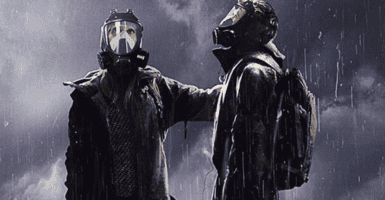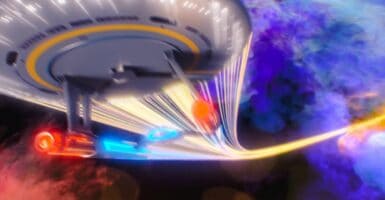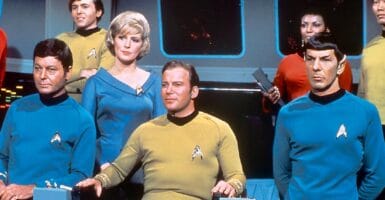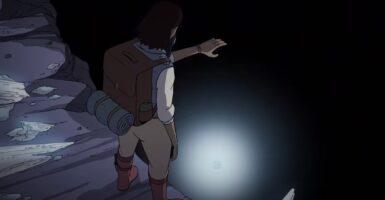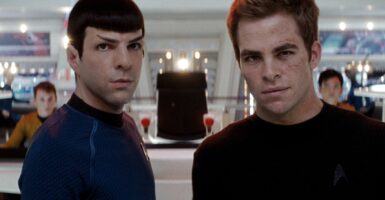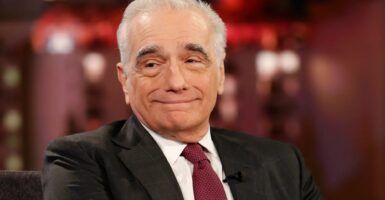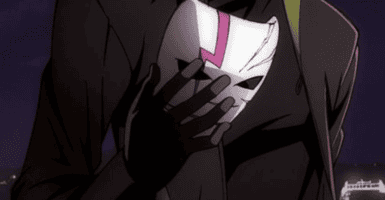BBC America Will Celebrate Science Fiction With Star-Studded New Documentary Series
This article is more than 2 years old
 With new Star Wars films in the works, Guardians of the Galaxy set to kick ass this summer, and yesterday’s announcement about a TV adaptation of Frederik Pohl’s Hugo-winning novel Gateway, there’s a lot for a science fiction fan to be excited about these days. And as much as I love reading, watching, or otherwise exploring all the crazy stories and worlds our favorite genre has to offer, I’m also a sucker for things that did into the fascinating history of it all, such as the Jodorowsky’s Dune documentary or the true story behind Argo’s movie within a movie. So my interest is definitely piqued by The Real History of Science Fiction, a new documentary series in the works for the BBC and BBC America.
With new Star Wars films in the works, Guardians of the Galaxy set to kick ass this summer, and yesterday’s announcement about a TV adaptation of Frederik Pohl’s Hugo-winning novel Gateway, there’s a lot for a science fiction fan to be excited about these days. And as much as I love reading, watching, or otherwise exploring all the crazy stories and worlds our favorite genre has to offer, I’m also a sucker for things that did into the fascinating history of it all, such as the Jodorowsky’s Dune documentary or the true story behind Argo’s movie within a movie. So my interest is definitely piqued by The Real History of Science Fiction, a new documentary series in the works for the BBC and BBC America.
The show will explore the history of the genre over the course of four episodes, featuring interviews with filmmakers, writers, actors, artists, and scientists about how science fiction has shaped its corner of pop culture, and about their own career experiences within it. Writer/actor Mark Gatiss (Sherlock, Doctor Who) will narrate the series, and it will feature a ridiculous collection of sci-fi icons. Just check out this rundown:
William Shatner (Star Trek), Nathan Fillion (Firefly), Zoe Saldana (Avatar, Star Trek), Steven Moffat (Doctor Who), Richard Dreyfuss (Close Encounters of the Third Kind), Chris Carter (The X-Files), Ronald D. Moore (Battlestar Galactica), John Landis (An American Werewolf in London, Schlock), David Tennant (Doctor Who), Christopher Lloyd (Back to the Future), Rutger Hauer (Blade Runner), John Carpenter (Dark Star, The Thing), Karen Gillan (Doctor Who), Neil Gaiman (The Sandman, Stardust), Kim Stanley Robinson (Mars Trilogy), Scott Bakula (Quantum Leap, Star Trek: Enterprise), Ursula K Le Guin (The Left Hand of Darkness), Syd Mead (Blade Runner), Kenny Baker (Star Wars), Anthony Daniels (Star Wars), Nichelle Nichols (Star Trek), Peter Weller (Robocop), Edward James Olmos (Blade Runner, Battlestar Galactica), and many more.
I’m glad to see there’s a nice mix of different vocations in there, from actors to directors to authors. Science fiction’s legacy is spread across so many mediums, it’d be a damn shame if they focused too heavily on just one corner of the genre as a whole.
The Real History of Science Fiction will be divided into four episodes, each covering a broad sci-fi category: Robots, Space, Invasion, and Time. You can check out the synopsis for each of them below.
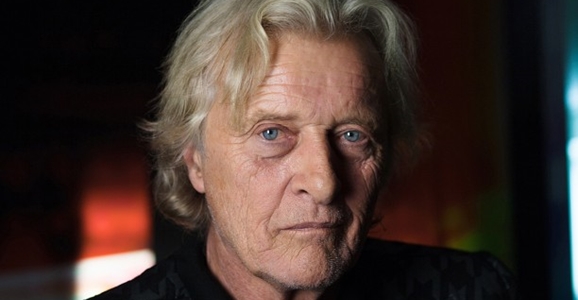 Robots — premieres April 19, 2014
Robots — premieres April 19, 2014
What if our creations turn against us? The idea of creating life has fascinated society since the earliest days of science fiction. The first installment of the four-part series, Robots transports viewers from the first steps of Frankenstein’s monster to the threat provided by the Terminator and the world of Cyberspace. Find out how Rutger Hauer created one of the greatest speeches in all of science fiction for Blade Runner. Discover from Kenny Baker the challenge of acting in Star Wars while inside the body of R2-D2, and learn how Anthony Daniels was drawn to the role of C-3PO by concept art modeled closely on the robot from the silent classic Metropolis. Douglas Trumbull (2001: A Space Odyssey, Blade Runner) discusses how he managed to create a whole new approach to robot design. The creators of the original Robocop describe how its hidden depths have given it enduring appeal and William Gibson reveals the origins of his seminal novel Neuromancer. From HAL in 2001: A Space Odyssey to the Cylons of the reimagined Battlestar Galactica and the world of The Matrix, this is a journey that asks — what does it mean to be human?
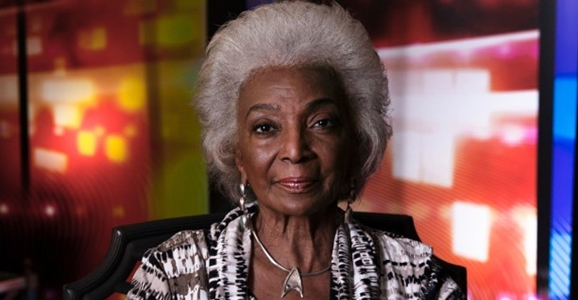 Space — premieres April 26
Space — premieres April 26
What if we could explore the vastness of Space? Science fiction has always fed upon our need to explore — to wonder what is out there. Space journeys from Jules Verne’s earliest ideas about attempts to leave our planet, to the Star Wars far away galaxy through to Nichelle Nichols revealing how her groundbreaking role as Lt. Uhura in Star Trek led to her participation in the recruitment of NASA’s astronauts. It explores the deep sea inspiration for Avatar, finds out why Ursula K. Le Guin wrote The Left Hand of Darkness and discovers how Stanley Kubrick was able to make 2001: A Space Odyssey seem so believable. In addition, the program looks at the way Dune and The Mars Trilogy embraced the challenge of world building and discusses the appeal of the beaten up ‘dirty space’ of Dark Star and Firefly. From the horrifying scenes of Alien, to the epic spectacle of Star Wars, this is a journey to the stars and the alien encounters that await us there.
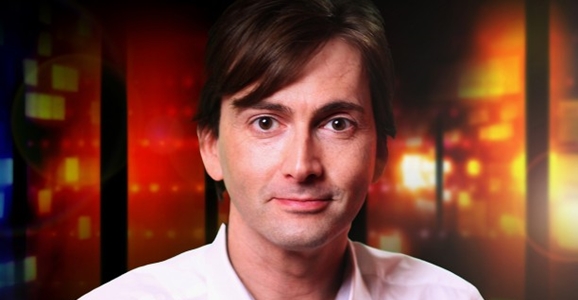 Invasion — premieres May 3
Invasion — premieres May 3
What if aliens landed on Earth? Much of science fiction explores the moment of first contact — what will people do when the aliens land? From H.G. Wells’ pioneering The War of the Worlds to Independence Day, Men in Black, and District 9, Invasion deals with our fears of alien invasions of earth. David Tennant explains the appeal of Doctor Who’s Daleks and Cybermen while John Carpenter and Chris Carter explore the rich appeal of the paranoia fueled by hidden aliens with The Thing and The X-Files. It also asks, what if the monsters were our own creation? With the aid of rarely seen animation tests, Phil Tippett takes us behind the scenes in the creation of the dinosaurs of Jurassic Park. But not all invasions are hostile. Peter Coyote and Richard Dreyfuss discuss the creation of Spielberg’s spellbinding classics E.T. the Extra-Terrestrial and Close Encounters of the Third Kind. There is more than one kind of invasion.
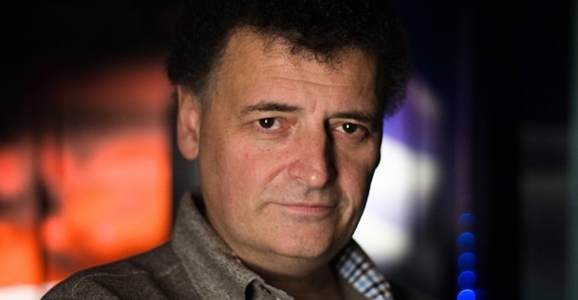 Time — (no premiere date given, but presumably May 10
Time — (no premiere date given, but presumably May 10
What if we could travel not just through space, but through time itself? If you could travel through time, would you change the past or the future? What if you found it couldn’t be changed? What price does the time traveler — and the people they are closest to — pay? This is a journey from H.G. Wells’ The Time Machine through ideas like The Grandfather Paradox and The Butterfly Effect to the professional time traveler that is the ever popular Doctor Who. Steven Moffat, David Tennant, Karen Gillan, and Neil Gaiman offer a unique perspective on the Doctor. Edward James Olmos reveals the hidden meaning of the language he created for the vision of the future that is Blade Runner. Bob Gale and Christopher Lloyd take us behind the scenes of Back to the Future, while Ed Solomon describes the joy of solving a time travel conundrum for Bill & Ted’s Excellent Adventure. But what would be the physical and emotional cost to the time traveller? Audrey Niffenegger explains what inspired her novel The Time Traveler’s Wife. And what if someone from the future tried to travel back in time to warn us? Would we believe them? From the apocalyptic tones of 12 Monkeys to the drama of Quantum Leap and the comedy of Groundhog Day, time travel is a subject that has been irresistible to the creators of every type of science fiction.
